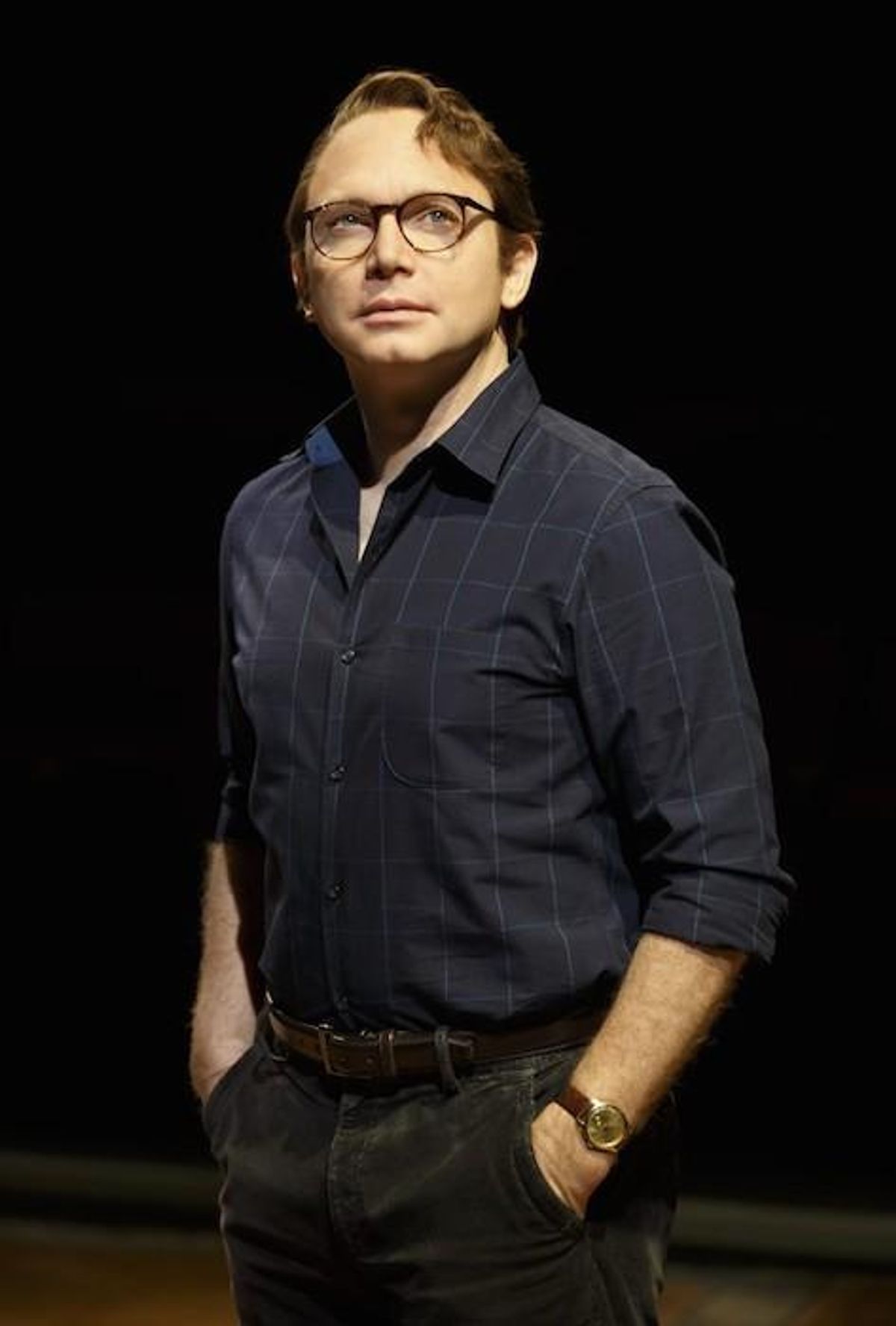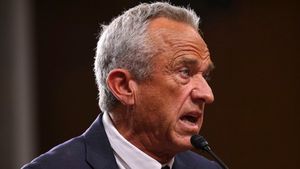When Michael Cerveris, who plays the closeted Bruce Bechdel in the Broadway musical Fun Home, begins his final song, "Edges of the World," he sings: "I fucking love beginnings, flying high." And while Cerveris' journey with Fun Home started years ago, he will continue to fly high until the production's final performance on Sept. 10.
Coming down from those heights, however, may take some adjustment. Relaxing in his 1970s-styled dressing room adorned with lava lamps and vinyl records of The Partridge Family, he detailed the physical and emotional toll his performances take on his body and spirit.
"I think as much as I'm going to miss this terribly, it's probably good for me that it's drawing to a close," he says.
The close of Fun Home marks a period of art mirroring life for Cerveris, who, for more than three years, has brought Bruce to life on stage in an intense performance that earned him his second Tony Award. A married suburban father of three and discreet gay man, Bruce was the real-life father of Alison Bechdel, the acclaimed cartoonist and creator of the comic strip Dykes to Watch Out For. Alison's childhood, which she chronicled in the graphic novel of the same name, detailed her coming out to her family as a lesbian and subsequently learning that her father was also gay. His death, a suspected suicide, took place shortly after these revelations.

Photo of Sydney Lucas & Michael Cerveris by Joan Marcus
Emotionally demanding roles are nothing new to Cerveris, who made his Broadway debut playing the title role in The Who's Tommy and remained with the musical for more than 1,400 performances. (He also set the record for playing the most performances as the East German rock 'n' roll singer Hedwig in Hedwig and the Angry Inch.) While creating the character of Bruce, Cerveris didn't shy away from the complexities of the man. In fact, his main concern upon joining the cast was that the audience not dismiss Bruce as a neglectful parent or bad person. Instead, he strove to portray Bruce's complex identity, especially the pain he experienced when refusing to acknowledge his authentic self. To do this believably, Cerveris drew from his own experiences and memories of loved ones who kept their sexuality a secret.
"I grew up in essentially the same time period as Alison, and I have had extremely dear close friends who are gay and not out, or I knew they were gay, but they were not out professionally," he says. "I've seen first-hand what that does to people and how they have to construct a version of themselves in certain situations."
While Cerveris pulled from his past to help create the character of Bruce, his experience in Fun Home has been richly shaped by current events. Along with performing eight shows a week, the cast has worked to spread the message of Fun Home beyond West 50th Street. Following their Off-Broadway run at the Public Theater, they traveled to South Carolina, where the College of Charleston was threatened with a state budget cut after students had been encouraged to read Bechdel's memoir. The cast and creators presented two concerts and question-and-answer sessions at an off-campus auditorium, both of which were sold out.
"They said it wasn't just the LGBTQ students who obviously felt supported and emboldened by this public show of support and not just us showing up from outside," he says. "But 1,500 people in their community showing up and being able to look around and go, 'I'm not the only person who thinks this way and thinks that this is outrageous.' It seemed to open a door to a whole group of students from different backgrounds and with different reasons for feeling marginalized, suddenly feeling not marginalized anymore--feeling like they had a voice and wanted to use it."
The integration of acting and activism is natural for the cast of Fun Home, who performed the same day of the historic Supreme Court ruling on marriage equality, a night Cerveris describes as "extraordinary." And they recently took their act on the road again. Following the June 12 attack at Pulse Nightclub, the Fun Home team traveled to Orlando to give a benefit performance of the musical in concert. The event, Cerveris said, was cathartic for the actors as well as the audience.

Cast-signed Fun Home shirt at the Pulse nightclub memorial
"It's a complicated thing because I don't feel any need to publicize the fact that I'm heterosexual," he says. "I don't care what people who don't know me think of my private life. It's not any of their business or my responsibility to inform them or let them know."
But due to the highly publicized aspects of Fun Home, Cerveris has felt conflicted when speaking about rights for the LGBTQ community. "There have been times when I've been sort of torn, because I don't want to be in the position of speaking for the gay community when I technically am not," he says. "And yet I worry sometimes that to preface my comments with, 'I'm not gay, but I think...' might sound like I'm trying to make sure people know that I'm straight. I try to kind of not have to answer them unless it's really specifically required."
"At the same time," he continues, "I stand very solidly with the people in my life who are being oppressed or treated unfairly because of their sexuality. So an attack on them, I take personally, too. I feel like their fight is my fight, to a certain extent. I think there is heterosexual privilege in the same way there's white privilege. I try to be mindful of that and respectful of it, but also participate and be an ally and compatriot as much as I can."
Cerveris' compassion for the LGBTQ community is apparent. When asked what he would say to Bruce--if he could tell him anything--the actor paused for a long moment before quietly answering: "I'm sorry you had to live like that. And I'm sorry maybe you didn't realize how loved you were."

Photo of the Fun Home cast by Joan Marcus
Following its closure on Broadway,Fun Home's message of love and acceptance, as well as tragedy and mourning, will continue. A national tour will launch in fall 2016, a new beginning that inspires bittersweet feelings for Cerveris as he reflects on his time with the show.
"We've played through an extraordinary moment in our country's history and the most progressive and heartening ways and the most retroactive and terrifying ways," he says. "We played through the Supreme Court's decision, we played through the naming of the first national monument to gay and lesbian rights, and we played through a massacre that was horrific enough in itself and in its aftermath, when some of the hatred and reactionary comments that were made were just as horrifying. If there was ever a play that arrived on Broadway in the moment it was most needed, I think this would be it."
Carey Purcell is a New York-based writer, reporter, and theater critic. She has been published in The New Yorker, Politico, TheNation, People, Playbill, American Theatre Magazine, Elle, DameMagazine, Bust, Alternet, Jezebel, and HowlRound.com. Follow her on Twitter @CareyPurcell.




























































































